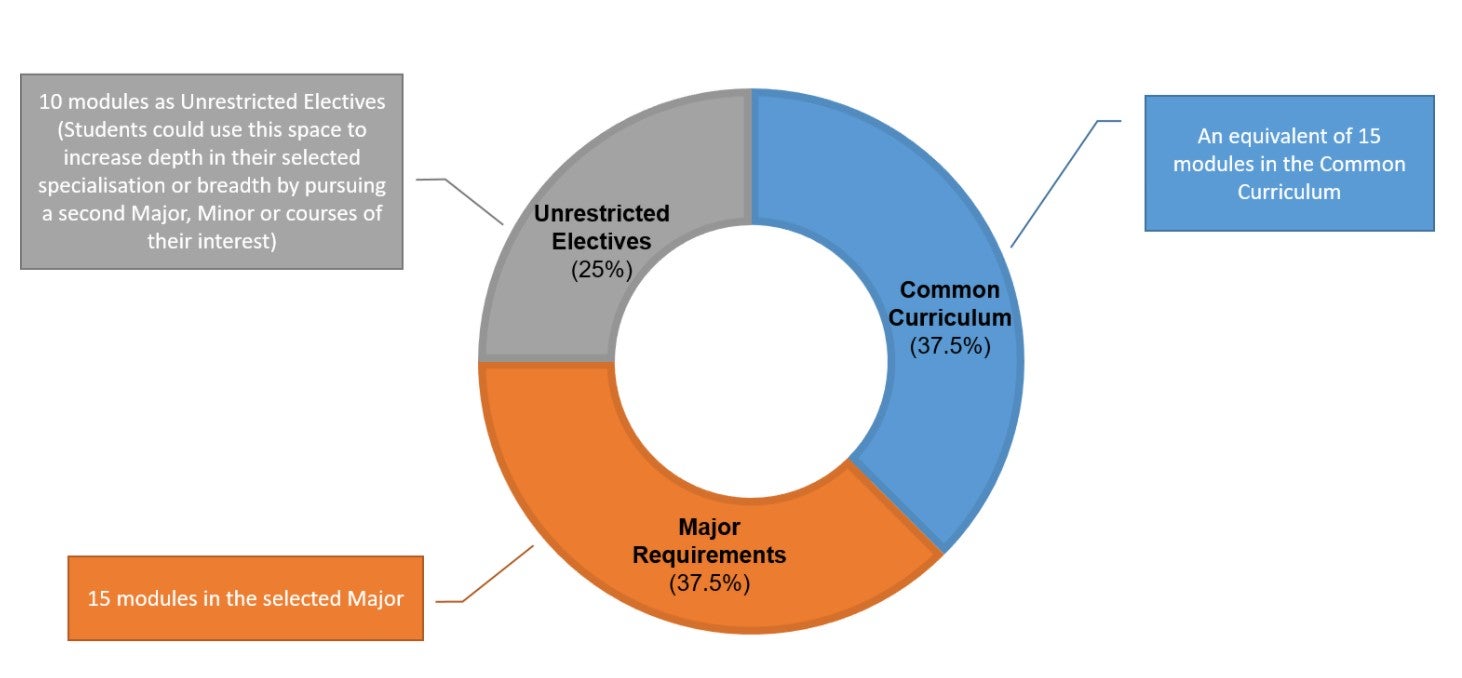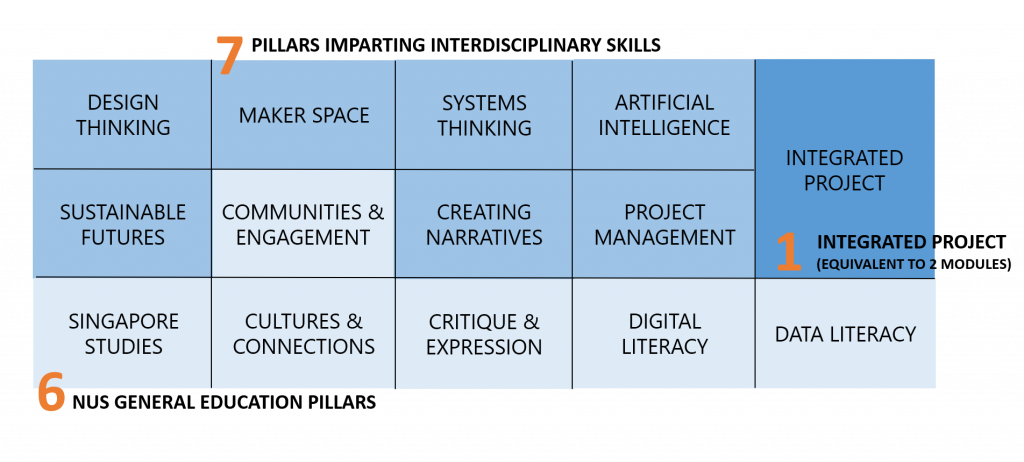Faculty of Engineering
The College of Design and Engineering (CDE) came into existence on 1 January 2022 from the merger of the Faculty of Engineering (FoE) and the School of Design and Environment (SDE). Do check cde.nus.edu.sg for the latest on CDE’s programmes.
Undergraduate Education
- Bachelor of Engineering (Biomedical Engineering)
- Bachelor of Engineering (Chemical Engineering)
- Bachelor of Engineering (Civil Engineering)
- Bachelor of Engineering (Computer Engineering)
- Bachelor of Engineering (Electrical Engineering)
- Bachelor of Engineering (Engineering Science)
- Bachelor of Engineering (Environmental Engineering)
- Bachelor of Engineering (Industrial & Systems Engineering)
- Bachelor of Engineering (Materials Science & Engineering)
- Bachelor of Engineering (Mechanical Engineering)
Degree Requirements (Cohorts 2021/2022 onwards)
FoE, together with School of Design and Environment (SDE), will adopt a new undergraduate curriculum structure for students enrolled in the new academic year starting in August 2021. Students will read a total of 160 modular credits (or the equivalent of 40 modules), as shown in the following schema:

The Common Curriculum is jointly developed by FoE, SDE and 6 industry partners who sit on the task force. It seeks to integrates knowledge and skillsets relevant to the professional training offered by both schools and to equip students with essential 21st century competencies. The following pillars make up the Common Curriculum, comprising 60 MCs (or the equivalent of 15 modules):

For more information, please visit https://cde.nus.edu.sg/undergraduate.
Internships are a key facet of our emphasis on learning by doing. Through them, you gain perspectives on real-world issues while working on real-life projects alongside engineering practitioners. Depending on your programme, you would embark on a compulsory* industrial attachment (IA) of at least 20 weeks or a 12-week Vacation Internship Programme (VIP).
Industrial Attachment Programme
The Industrial Attachment Programme is for students who are admitted into the B.Eng. degree requiring a compulsory internship of at least 20 weeks. Internships integrate knowledge and theory learnt in the classroom with practical application and skill development in a professional setting. It enables students to learn about the latest developments in the industries and to interact with engineers and other professionals as they join projects or tasks that help to develop or enhance their skills whilst contributing to the organization.
EG3611A awards 10MCs for 20 weeks of internship while EG3611 awards 12MCs for 24 weeks of internship. The internships can be performed locally or overseas during the semester and students can apply for the approved internships approved by the Faculty via TalentConnect or seek approval for self-sourced internships.
Students will have to complete the following deliverables as part of the Industrial Attachment.
- Workplan,
- Interim presentation and report
- Final presentation and report
Students will be jointly evaluated by their work supervisor and NUS internship mentor on factors such as professionalism and conduct, verbal and written communication, ability to understand context and apply technical training. The module will be graded on a CS/CU basis and students are only allowed to earn modular credits for completion of one internship.
Students on Industrial Attachment are allowed to take a maximum of two evening modules, subject to approval from the employer. Strictly no day-time modules allowed.
EG2401/EG2401A (Prerequisite ES1531/ES2531) should be read either before or during the semester on internship.
*The following students are exempted from compulsory internship:
- Engineering Scholars Programme
- Double Degree Programme (DDP)
- Concurrent Degree Programme (CDP)
- Polytechnic-Direct Entry
Students may also fulfil your compulsory internship at the NUS Overseas Colleges (NOC), where you would intern at a start-up company in some of the most exciting technology hubs worldwide. This applies for E-Scholars.
Vacation Industrial Attachment
The Vacation Industrial Attachment programme is for students who are admitted into the B.Eng. degree requiring a compulsory internship of at least 12 weeks. Internships integrate knowledge and theory learnt in the classroom with practical application and skill development in a professional setting. It enables students to learn about the latest developments in the industries and to interact with engineers and other professionals as they join projects or tasks that help to develop or enhance their skills whilst contributing to the organization.
EG3612 awards 6MCs for 12 weeks of internship. The internships can be performed locally or overseas during the mid-year vacation period and students can apply for the approved internships approved by the Faculty via TalentConnect or seek approval for self-sourced internships.
Students will have to complete the following deliverables as part of the Industrial Attachment.
- Workplan,
- Presentation and report
Students will be jointly evaluated by their work supervisor and NUS internship mentor on factors such as professionalism and conduct, verbal and written communication, ability to understand context and apply technical training. The module will be graded on a CS/CU basis and students are only allowed to earn modular credits for completion of one internship.
The module applies to students from Engineering Science, Industrial Systems & Engineering and the Innovation & Design Programme, and is also offered as an additional option to students exempted from compulsory internship. Special Term tuition fees are exempted and students on Vacation Internship are strictly not allowed to take Special Term modules.
Students are encouraged to participate in a variety of programmes and activities to enrich their undergraduate journey. At the Faculty level, programmes in engineering innovation, technopreneurship, and research are introduced to better support students in personalising their education experience. Students will generally receive modular credits via Unrestricted Electives upon successful completion of a particular enhancement programme.
For details on the programmes, please visit the respective links below:
The Engineering Scholars (E-Scholars) Programme is a premier programme designed to attract the very best students to read any branch of engineering at NUS. Students with exceptional potential will be provided with an enhanced educational experience with the objective of capitalising on academic abilities and personal aspirations to train well-rounded leaders and innovators.
General structure of the programme
Students admitted to the E-Scholars programme are also enrolled in one of the Engineering Departments at NUS. The graduation requirements for E-Scholars is the same as all other Engineering students in the chosen Department. Nevertheless, E-Scholars will complete their B.Eng degree in 3 years. The distribution of modular credits across the 3 years is slightly different for each of the Departments. As a general example, the following table illustrates a possible schedule where the numbers represent modular credits (MC). A typical NUS module is worth 4 MC.
| Sem I | Sem II | TOTAL | |
| Advanced Placement Credits | 16 | ||
| Year 1 | 24 | 24 | 48 |
| Year 2 | 26 | 20(NOC) | 46 |
| Year 3 | 24(Possible SEP) | 26 | 50 |
| TOTAL | 160 | ||
With reference to the table above, please note the following
- Numbers may change slightly for each individual Department.
- The NUS Overseas Colleges (NOC) industrial attachment (6-month programme) is compulsory for E-Scholars (except for student from Polytechnic) and subsidized.
- The Student Exchange Programme (SEP) is optional (and subsidized). E-Scholars have guaranteed admission. It is recommended in year 3, sem 1 for some programmes.
- Advance Placement Credits are modules that E-Scholars will take before entering NUS. Students will study independently on textbooks and other reference material. They will then sit for a test to clear those credits.
For more information, please visit https://cde.nus.edu.sg/escholars/academics/.

